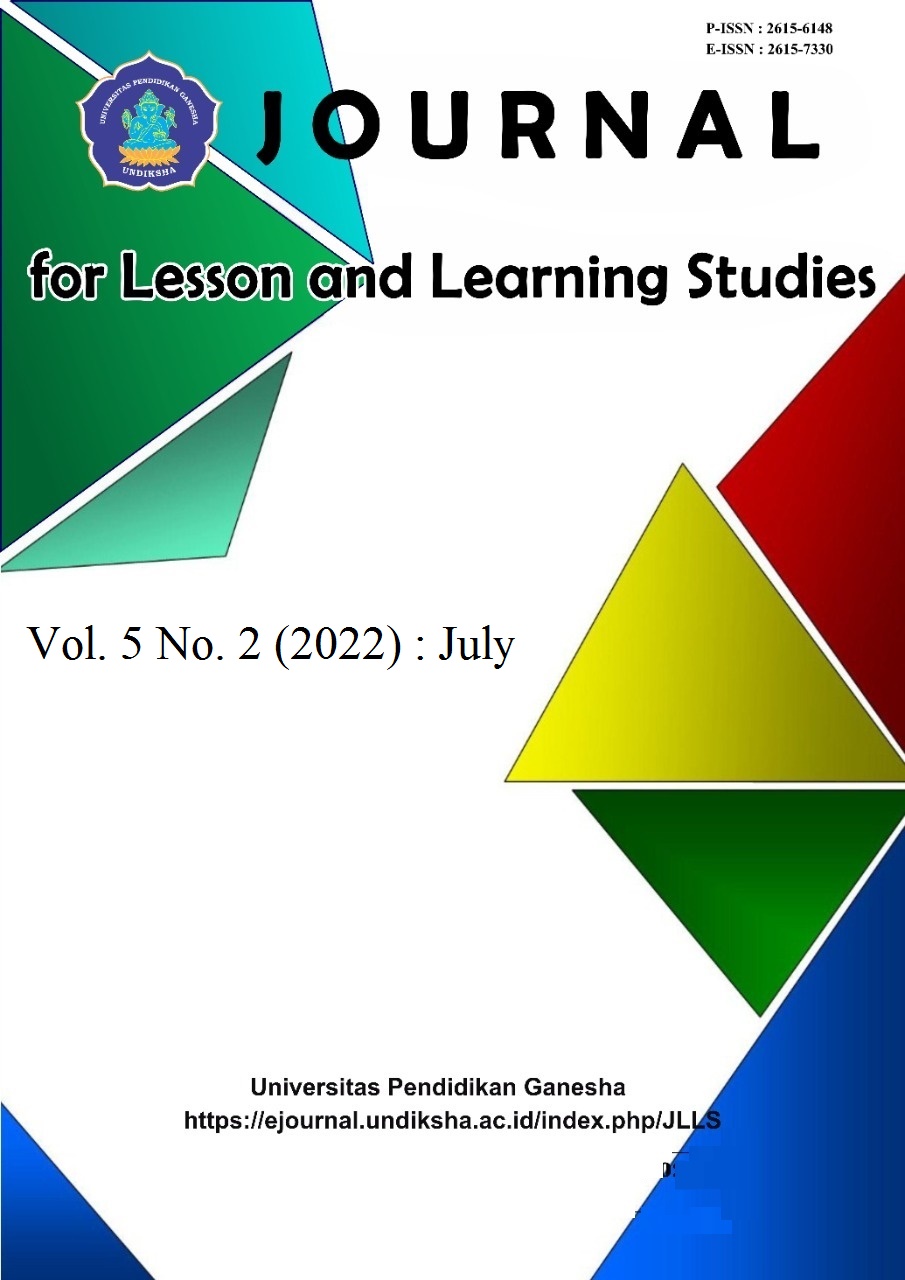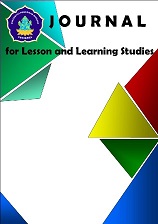The Assessment Instrument for Higher Order Thinking Skills in Learning Theme 8 (Bumiku) for Sixth Grade of Elementary School
DOI:
https://doi.org/10.23887/jlls.v5i2.52798Keywords:
Instruments, Sustainable Teaching Materials, elementary schoolAbstract
The assessment process carried out by teachers at this time is still not by the demands of 21st-century education. Some teachers use assessment instruments available on the internet without using the HOTS instrument. This study aimed to create a higher-order thinking skill (HOTS) assessment instrument for grade VI elementary school students. In this study, the development of the assessment instrument was guided by the Borg & Gall development model. In this study, the method used to collect data is the test method. The results of the content validity test tested by four expert lecturers of the HOTS assessment instrument were declared relevant, the item validity test conducted in 4 schools was declared valid, and the results of the reliability test of the HOTS assessment instrument were 0.82, which was in the very high category, the average test results The difference power of the questions is 0.43 which is in the excellent category, the average test results for the level of difficulty of the questions are 0.502 which are in the medium category. Based on this analysis, it can be said that the higher-order thinking skill (HOTS) assessment instrument in learning Theme 8 (Bumiku) in grade VI elementary school is feasible to use.
References
Afrita, M., & Darussyamsu, R. (2020). Validitas Instrumen Tes Berpikir Tingkat Tinggi (HOTS) pada Materi Sistem Respirasi di Kelas XI SMA. Jurnal Mangifera Edu, 4(2). https://doi.org/10.31943/mangiferaedu.v4i2.83. DOI: https://doi.org/10.31943/mangiferaedu.v4i2.83
Andoko. (2020). Peningkatan Hots Dan Prestasi Belajar Melalui Metode Inkuiri Kelas 7C SMPN 1 Wonosobo Tahun Pelajaran 2018/2019. Spektra: Jurnal Kajian Pendidikan Sains, 6(1). https://doi.org/10.32699/spektra.v6i1.134. DOI: https://doi.org/10.32699/spektra.v6i1.134
Andrian, & Rusman. (2019). Implementasi pembelajaran abad 21 dalam kurikulum 2013. Jurnal Penelitian Ilmu Pendidikan, 12(1). https://doi.org/10.21831/jpipfip.v12i1.20116. 14-23. DOI: https://doi.org/10.21831/jpipfip.v12i1.20116
Anwar, Y., Selamet, A., Huzaifah, S., & Madang, K. (2020). Training in Developing Higher-order Thinking Based Online Test Instrument for Biology Teacher in Sekayu City. Journal of Community Service and Empowerment, 1(3). https://doi.org/10.22219/jcse.v1i3.12241. DOI: https://doi.org/10.22219/jcse.v1i3.12241
Arif, M. (2016). Pengembangan Instrumen Penilaian Mapel Sains melalui Pendekatan Keterampilan Proses Sains SD/MI. Ta’allum: Jurnal Pendidikan Islam, 4(1). https://doi.org/10.21274/taalum.2016.4.1.123-148. DOI: https://doi.org/10.21274/taalum.2016.4.01.123-148
Astiwi, K. P. T., Antara, P. A., & Agustiana, I. G. A. T. (2020). Pengembangan Instrumen Penilaian Kemampuan Berpikir Kritis Siswa SD pada Mata Pelajaran PPKn. Jurnal Ilmiah Pendidikan Profesi Guru, 3(3), 459. https://doi.org/10.23887/jippg.v3i3.29457. DOI: https://doi.org/10.23887/jippg.v3i3.29457
Astuti, A. P., Aziz, A., Sumarti, S. S., & Bharati, D. A. L. (2019). Preparing 21st Century Teachers: Implementation of 4C Character’s Pre-Service Teacher through Teaching Practice. Journal of Physics: Conference Series, 1233(1), 012109. https://doi.org/10.1088/1742-6596/1233/1/012109. DOI: https://doi.org/10.1088/1742-6596/1233/1/012109
Bujuri, D. A. (2018). Analisis Perkembangan Kognitif Anak Usia Dasar dan Implikasinya dalam Kegiatan Belajar Mengajar. LITERASI (Jurnal Ilmu Pendidikan), 9(1), 37. https://doi.org/10.21927/literasi.2018.9(1).37-50. DOI: https://doi.org/10.21927/literasi.2018.9(1).37-50
Chang, L. S., & Lund, J. (2018). Assesment for Learning in Physical Education: The What, Why, and How. Journal Physical Education, Recreation, and Dance, 89(8). https://doi.org/10.1080/07303084.2018.1503119. DOI: https://doi.org/10.1080/07303084.2018.1503119
Dermawan, D. D., Wardani, S., & Pranoto, Y. K. S. (2021). Pengembangan Instrumen Assesmen HOTS pada Pembelajaran IPA Kelas V Sekolah Dasar. Jurnal Ilmiah Ilmu Kependidikan, 5(3). https://doi.org/10.26858/jkp.v5i3.21869.
Fauzy, A., & Nurfauziah, P. (2021). Kesulitan Pembelajaran Daring Matematika pada Masa Pandemi COVID-19 di SMP Muslimin Cililin. Jurnal Cendekia, 5(1). https://doi.org/10.31004/cendekia.v5i1.514. DOI: https://doi.org/10.31004/cendekia.v5i1.514
Fitriani, D., Suryana, Y., & Hamdu, G. (2018). Pengembangan Instrumen Tes Higher order thinking skill pada Pembelajaran Tematik berbasis Outdoor Learning di SD. Jurnal Ilmiah Pendidikan Guru Sekolah Dasar, 5(1). https://doi.org/10.17509/ijpe.v2i1.13752. DOI: https://doi.org/10.17509/ijpe.v2i1.13752
Gaol, P. L., Khumaedi, M., & Masrukan, M. (2017). Pengembangan Instrumen Penilaian Karakter Percaya Diri pada Mata Pelajaran Matematika Sekolah Menengah Pertama. Journal of Research and Educational Research Evaluation, 6(1). https://doi.org/10.15294/jrer.v6i1.16209.
Granberg, C., Palm, T., & Palmberg, B. (2021). A case study of a formative assessment practice and the effects on students’ self-regulated learning. Studies in Educational Evaluation. https://doi.org/10.1016/j.stueduc.2020.100955. DOI: https://doi.org/10.1016/j.stueduc.2020.100955
Hamidah, M., & Wulandari, S. S. (2021). Pengembangan Instrumen Penilaian berbasis HOTS menggunakan Aplikasi Quizizz. Efisiensi: Kajian Ilmu Adminsitrasi, 18(1). https://doi.org/10.21831/efisiensi.v18i1.36997. DOI: https://doi.org/10.21831/efisiensi.v18i1.36997
Hanik, A., Ashari, & Ngazizah, N. (2021). Pengembangan Instrumen Tes Berbasis Higher Order Thinking Skill (HOTS) Kelas V Madrasah Ibtidaiyah. Jurnal Pendidikan Dasar, 2(1). https://doi.org/10.37729/jpd.v2i1.967.
Hulukati, W., & Rahmi, M. (2020). Instrumen Evaluasi Karakter Mahasiswa Program Pendidikan Guru Pendidikan Anak Usia Dini. Jurnal Obsesi: Jurnal Pendidikan Anak Usia Dini, 4(8). https://doi.org/10.31004/obsesi/v4i2.468. DOI: https://doi.org/10.31004/obsesi.v4i2.468
Kurniasih, P. D., Nugroho, A., & Hermianto, S. (2020). Peningkatan Higher Order Thinking Skill (HOTS) dan Kerjasama Antar Peserta Didik Melalui Model Pembelajaran Problem Based Learning (PBL) dengan Media Kokami di Kelas IV SD Negeri Dukuhwaluh. Attadib Journal of Elementary Education, 4(1). https://doi.org/10.32507/attadib.v4i1.627. DOI: https://doi.org/10.32507/attadib.v4i1.627
Morze, N., Varchenko-Trotsenko, L., Terletska, T., & Smyrnova-Trybulska, E. (2021). Implementation of adaptive learning at higher education institutions by means of Moodle LMS. Journal of Physics: Conference Series, 1840(1). https://doi.org/10.1088/1742-6596/1840/1/012062. DOI: https://doi.org/10.1088/1742-6596/1840/1/012062
Msosa, A., Bruce, J., & Crouch, R. (2021). Effect of A Formative Assesment Intervention on Nursing Skills Laboratory Learning in A Resource-constrained Country. Nurse Education Today, 97. https://doi.org/10.1016/j.nedt.2020.104677. DOI: https://doi.org/10.1016/j.nedt.2020.104677
Muji. (2014). Pengembangan Perangkat Pembelajaran Keterampilan Membaca Model Pembelajaran Kontekstual. Jurnal Pancaran, 3(4).
Oktavia, Ambar, & Agustin, H. (2020). Umbul Card: A Traditional Game as Nutrition Education Media Among Elementary School Students. International Journal of Education Research Review, 5(1). https://doi.org/10.24331/ijere.646821. DOI: https://doi.org/10.24331/ijere.646821
Pratiwi, P. H., Nur, H., & Martiana, A. (2017). Pengembangan Modul Mata Kuliah Penilaian Pembelajaran Sosiologi Berorientasi Hots. Jurnal Cakrawala Pendidikan, 36(2), 201–209. https://doi.org/10.21831/cp.v36i2.13123. DOI: https://doi.org/10.21831/cp.v36i2.13123
Redhana, I. W. (2019). Mengembangkan Keterampilan Abad Ke-21 Dalam Pembelajaran Kimia. Jurnal Inovasi Pendidikan Kimia, 13(1), 2239–2253. https://doi.org/10.15294/jipk.v13i1.17824.
Sa’adah, S. I., Rasmiwetti, R., & Linda, R. (2019). Pengembangan Soal Hots Dengan Wondershare Quiz Creator Sebagai Media Display Pada Materi Stoikiometri Kelas X. JTK (Jurnal Tadris Kimiya), 4(2). https://doi.org/10.15575/jtk.v4i2.5469. DOI: https://doi.org/10.15575/jtk.v4i2.5469
Salim, & Haidir. (2019). Penelitian Pendidikan Metode, Pendekatan, dan Jenis. Kencana.
Salmia, & Yusri, M. (2021). Peran Guru dalam Pembelajaran Abad 21 di Masa Pandemik Covid-19. Indonesian Journal of Primary Education, 5(1), 82–92. https://doi.org/10.17509/ijpe.v5i1.31955. DOI: https://doi.org/10.17509/ijpe.v5i1.31955
Saraswati, P. M. S., & Agustika, G. N. S. (2020). Kemampuan Berpikir Tingkat Tinggi dalam Menyelesaikan Soal HOTS Mata Pelajaran Matematika. Jurnal Ilmiah Sekolah Dasar, 4(2). https://doi.org/10.23887/jisd.v4i2.25336. DOI: https://doi.org/10.23887/jisd.v4i2.25336
Seibert, S. A. (2021). Problem-based learning: A strategy to foster generation Z’s critical thinking and perseverance. Teaching and Learning in Nursing, 16(1). https://doi.org/10.1016/j.teln.2020.09.002. DOI: https://doi.org/10.1016/j.teln.2020.09.002
Solihah, A. N., Jubaedah, Y., & Rifa’i, M. S. S. (2020). Pengembangan Instrumen Pengukuran Perkembangan Sosial-Emosional Anak Berbasis Home-Based Childcare. Widyadari, 6(1). https://doi.org/10.5281/zenodo.3517997.
Subagia, I. W., & Wiratma, I. G. L. (2016). Profil Penilaian Hasil Belajar Siswa Berdasarkan Kurikulum 2013. JPI (Jurnal Pendidikan Indonesia), 5(1), 39–54. https://doi.org/10.23887/jpi-undiksha.v5i1.8293. DOI: https://doi.org/10.23887/jpi-undiksha.v5i1.8293
Syudirman, & Saputra, A. (2020). (2020). Konsep Higher order thinking skill (HOTS) pada Pembelajaran Tematik di SD/MI. Jurnal Pemikiran dan Penelitian Pendidikan Dasar, 4(1). https://doi.org/10.52266/el-muhbib.v4i2.557. DOI: https://doi.org/10.52266/el-muhbib.v4i2.557
Thoyyibah, N., Hartono, R., & Bharati, D. A. L. (2019). The Implementation of Character Education in the English Teaching Learning Using 2013 Curriculum. English Education Journal, 9(2), 254–266. https://doi.org/10.15294/eej.v9i2.30058. DOI: https://doi.org/10.15294/eej.v9i2.30058
Umami, R., Rusdi, M., & Kamid, K. (2021). Pengembangan Instrumen Tes Untuk Mengukur Higher Order Thinking Skills (Hots) Berorientasi Programme For International Student Asessment (Pisa) Pada Peserta Didik. JP3M: Jurnal Penelitian Pendidikan dan Pengajaran Matematika, 7(1). https://doi.org/10.37058/jp3m.v7i1.2069. DOI: https://doi.org/10.37058/jp3m.v7i1.2069
Wicaksono, T. P., Muhardjito, & Harsiati, T. (2016). Pengembangan Penilaian Sikap dengan Teknik Observasi, Self Assesment, dan Peer Assesment pada Pembelajaran Tematik Kelas V SDN Arjowinangun 02 Malang. Jurnal Pendidikan: Teori, Penelitian, dan Pengembangan, 1(1). https://doi.org/10.17977/jp.v1i2.5214.
Widiyati, & Wiwik. (2014). Belajar dan Pembelajaran Perspektif Teori Kognitivisme. Jurnal Biology Science & Education, 3(2). https://doi.org/10.33477/bs.v3i2.521. DOI: https://doi.org/10.33477/bs.v3i2.521
Widodo, S., & Wardani, R. K. (2020). Mengajarkan Keterampilan Abad 21 4C (Communication, Collaboration, Critical Thinking And Problem Solving, Creativity And Innovation) Di Sekolah Dasar. MODELING: Jurnal Program Studi PGMI, 7(2), 185–197. https://doi.org/10.36835/modeling.v7i2.665.
Yusup, F. (2018). Uji Validitas dan Reliabilitas Instrumen Penelitian Kuantitatif. Jurnal Tarbiyah : Jurnal Ilmiah Kependidikan, 7(1), 17–23. https://doi.org/10.18592/tarbiyah.v7i1.2100. DOI: https://doi.org/10.18592/tarbiyah.v7i1.2100
Zuliani, D., Florentinus, T. S., & Ridlo, S. (2017). Pengembangan Instrumen Penilaian Karakter pada Siswa Kelas IV Sekolah Dasar. Journal of Research and Educational Research Evaluation, 6(1). https://doi.org/10.15294/jrer.v6i1.16207.
Zuliani, Dewi, Florentinus, T. S., & Ridlo, S. (2017). Pengembangan Instrumen Penilaian Karakter pada Siswa Kelas IV Sekolah Dasar. Journal of Research and Educational Research Evaluation, 6(1).
Downloads
Published
How to Cite
Issue
Section
License
Copyright (c) 2022 kadek evan astra arsiana, Kadek Yudiana, Putu Aditya Antara

This work is licensed under a Creative Commons Attribution-ShareAlike 4.0 International License.
Authors who publish with the Journal for Lesson and Learning Studies agree to the following terms:
- Authors retain copyright and grant the journal the right of first publication with the work simultaneously licensed under a Creative Commons Attribution License (CC BY-SA 4.0) that allows others to share the work with an acknowledgment of the work's authorship and initial publication in this journal.
- Authors are able to enter into separate, additional contractual arrangements for the non-exclusive distribution of the journal's published version of the work (e.g., post it to an institutional repository or publish it in a book), with an acknowledgment of its initial publication in this journal.
- Authors are permitted and encouraged to post their work online (e.g., in institutional repositories or on their website) prior to and during the submission process, as it can lead to productive exchanges, as well as earlier and greater citation of published work. (See The Effect of Open Access)





